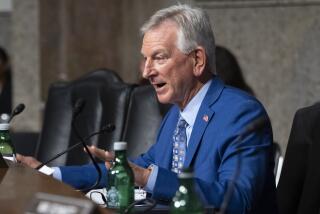WASHINGTON INSIGHT
- Share via
SEMPER ‘BYE?: The Marine Corps is looking for a few good ideas. Gen. Charles C. Krulak, the Marines’ new commandant, has kicked off his first month in office by ordering every unit in the Corps to take some time out between July 21 and Aug. 7 to reflect on how it could do its job better. When the exercise is over, everyone will get three days of liberty. To help things along, Krulak has put out a 29-page memo setting forth his own views on what the Marines should be doing. Although the Marines have ordered such special “stand-downs” before--to assess aviation safety rules or address other problems--this marks the first occasion the entire Corps has taken time off to review procedures. But the Marines won’t be letting their defenses down: The entire Corps won’t be off the job at once. Plenty of units will be at their usual state of readiness at any given time.
*
UNCONNECTED: Merrick Garland, the No. 2 man in the deputy attorney general’s office who initially directed the Oklahoma City bombing investigation, is under consideration for the U.S. Circuit Court of Appeals for the District of Columbia. Garland, who was expected to take over the Justice Department’s criminal division, draws high marks from subordinates, colleagues and superiors for competence, energy and technical brilliance. But for the court post, those qualifications almost certainly are not enough. Naming him to the Washington appellate court, second in importance only to the Supreme Court, would not pay off chits to any U.S. senator. Even though Garland’s mentors include Deputy Atty. Gen. Jamie S. Gorelick, prospects are that in the end, the 42-year-old attorney will take command of the criminal division by this fall.
*
CAUTIOUS CONTENDERS: As regulatory agencies go, the Federal Election Commission has a reputation among political pros as a paper tiger--slow-moving, timid and reluctant to mete out any punishment more severe than a wrist slap. But you could not tell that was the case from the behavior of some of the presidential hopefuls. Publisher Malcolm S. (Steve) Forbes recently delayed an announcement that he was considering making a long-shot run for the GOP nomination, advisers say, because his attorneys advised him that using his office staff and premises to prepare the statement would amount to a corporate contribution from his magazine. On similar grounds, California Gov. Pete Wilson’s staff refused to send a bill to a reporter for a campaign jaunt on a chartered flight from Concord, N.H., to Boston, insisting that they receive a check for the $181 fare before the plane landed.
*
ADULT BEHAVIOR: The seamy side of diplomacy is the tit-for-tat retaliation. You catch and expel one of the spies we have stashed in your embassy, we’ll expel one of your embassy officials. But the Clinton Administration is trying to reach the high ground in a festering dispute with Beijing over China’s detention of Harry Wu, who was arrested in June after he crossed the border between Kazakhstan and China. Wu, a U.S. citizen who resides in Milpitas, Calif., spent 19 years in Chinese jails and had returned to his homeland to investigate human rights abuses. The Chinese refuse even to say where Wu is being held, a clear violation of a treaty between the two countries. Acting on a tip that Wu was in a remote village near the Kazakh border, a U.S. diplomat, Charles Parish, took a 12-hour taxi ride to the town only to be told that Wu had never been there. State Department spokesman Nicholas Burns uses such words as “inexcusable,” “unorthodox,” “bizarre” and “unjustified” to describe the Chinese action. But he says Washington is not ready to start looking for ways to retaliate. “The answer, because we want to have a mature relationship, is to be mature about it,” he says.
More to Read
Get the L.A. Times Politics newsletter
Deeply reported insights into legislation, politics and policy from Sacramento, Washington and beyond. In your inbox twice per week.
You may occasionally receive promotional content from the Los Angeles Times.










